Digital Marketing Strategies and Analysis for Booking.com: A Report
VerifiedAdded on 2023/01/05
|12
|3597
|68
Report
AI Summary
This report provides an in-depth analysis of Booking.com's digital marketing strategies. It begins with an introduction to the company and the digital platforms it utilizes, followed by a PESTLE analysis to evaluate the impact of external factors on its digital marketing campaigns. The report then delves into Booking.com's use of the social web for brand awareness, comparing its approach to that of another organization. The integration of traditional and digital marketing for achieving strategic objectives is critically evaluated. The report also highlights the advantages and disadvantages of both traditional and digital marketing, concluding with an overall assessment of Booking.com's digital marketing effectiveness.
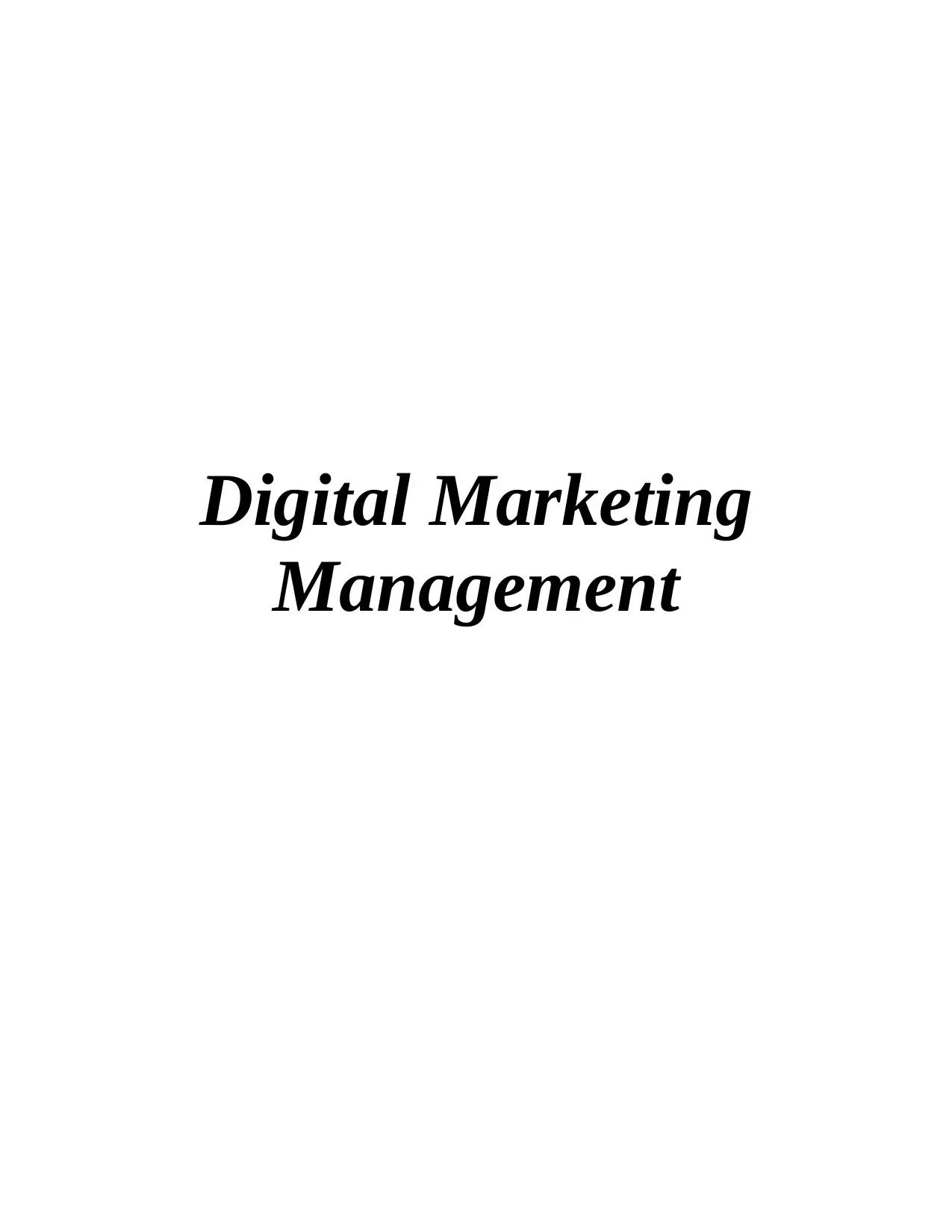
Digital Marketing
Management
Management
Paraphrase This Document
Need a fresh take? Get an instant paraphrase of this document with our AI Paraphraser
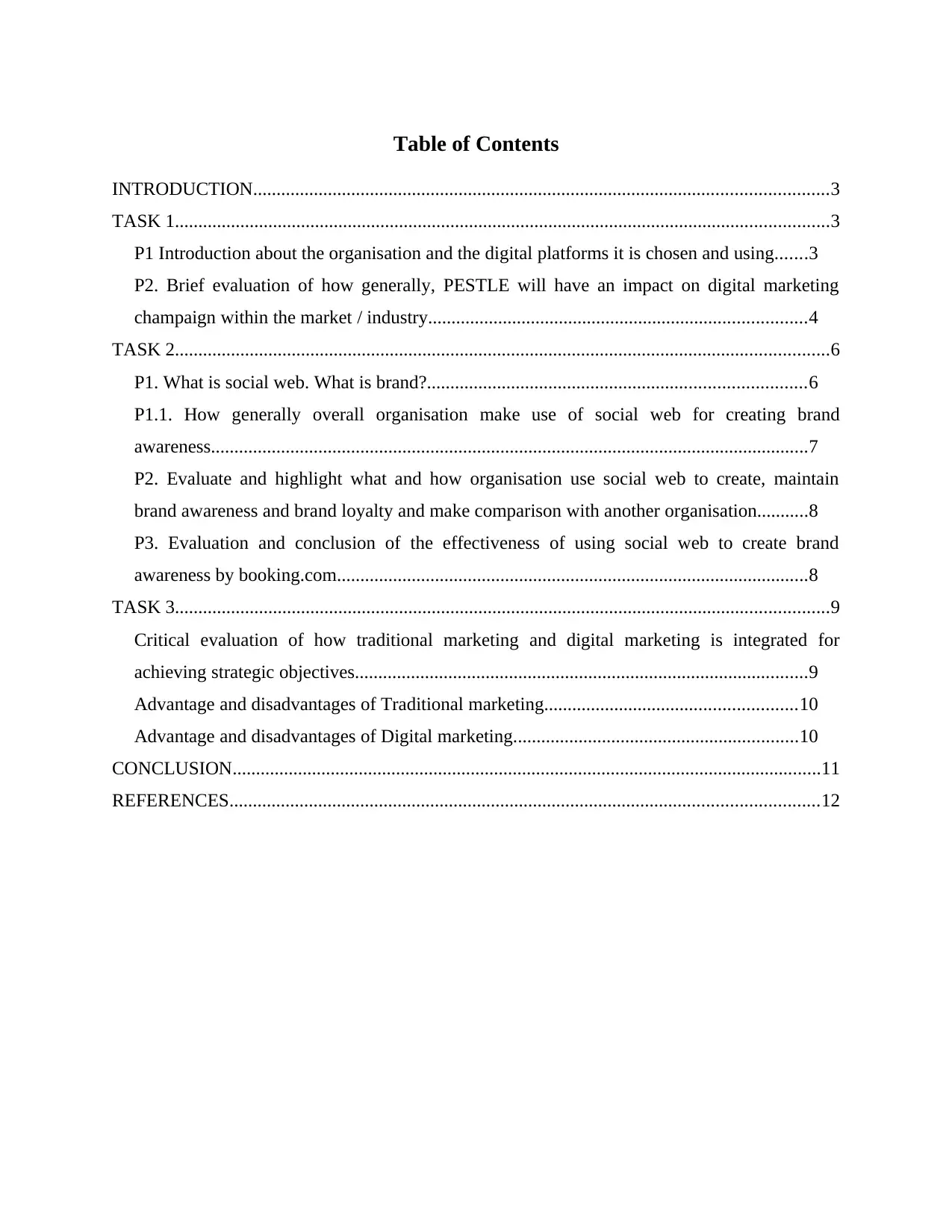
Table of Contents
INTRODUCTION...........................................................................................................................3
TASK 1............................................................................................................................................3
P1 Introduction about the organisation and the digital platforms it is chosen and using.......3
P2. Brief evaluation of how generally, PESTLE will have an impact on digital marketing
champaign within the market / industry.................................................................................4
TASK 2............................................................................................................................................6
P1. What is social web. What is brand?.................................................................................6
P1.1. How generally overall organisation make use of social web for creating brand
awareness................................................................................................................................7
P2. Evaluate and highlight what and how organisation use social web to create, maintain
brand awareness and brand loyalty and make comparison with another organisation...........8
P3. Evaluation and conclusion of the effectiveness of using social web to create brand
awareness by booking.com.....................................................................................................8
TASK 3............................................................................................................................................9
Critical evaluation of how traditional marketing and digital marketing is integrated for
achieving strategic objectives.................................................................................................9
Advantage and disadvantages of Traditional marketing......................................................10
Advantage and disadvantages of Digital marketing.............................................................10
CONCLUSION..............................................................................................................................11
REFERENCES..............................................................................................................................12
INTRODUCTION...........................................................................................................................3
TASK 1............................................................................................................................................3
P1 Introduction about the organisation and the digital platforms it is chosen and using.......3
P2. Brief evaluation of how generally, PESTLE will have an impact on digital marketing
champaign within the market / industry.................................................................................4
TASK 2............................................................................................................................................6
P1. What is social web. What is brand?.................................................................................6
P1.1. How generally overall organisation make use of social web for creating brand
awareness................................................................................................................................7
P2. Evaluate and highlight what and how organisation use social web to create, maintain
brand awareness and brand loyalty and make comparison with another organisation...........8
P3. Evaluation and conclusion of the effectiveness of using social web to create brand
awareness by booking.com.....................................................................................................8
TASK 3............................................................................................................................................9
Critical evaluation of how traditional marketing and digital marketing is integrated for
achieving strategic objectives.................................................................................................9
Advantage and disadvantages of Traditional marketing......................................................10
Advantage and disadvantages of Digital marketing.............................................................10
CONCLUSION..............................................................................................................................11
REFERENCES..............................................................................................................................12
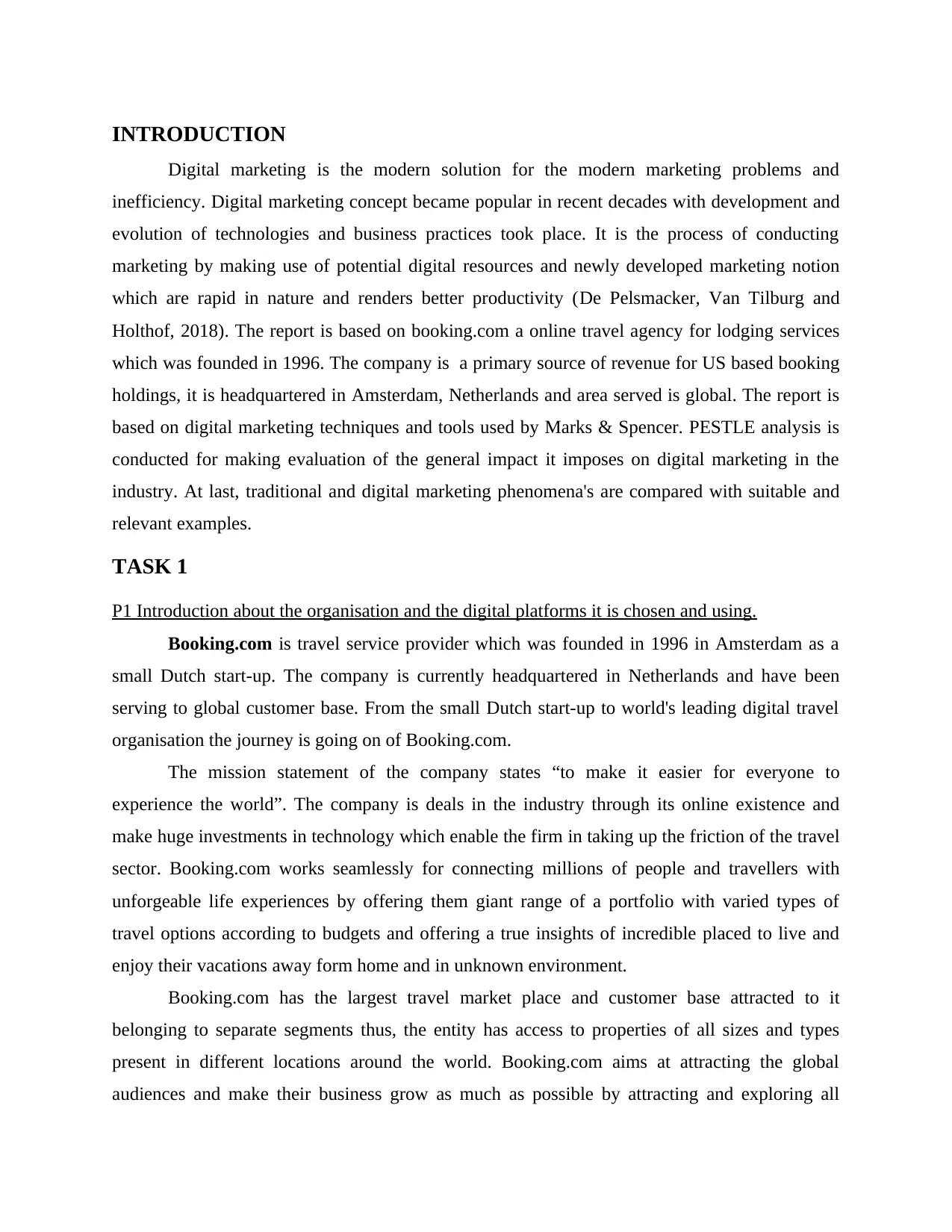
INTRODUCTION
Digital marketing is the modern solution for the modern marketing problems and
inefficiency. Digital marketing concept became popular in recent decades with development and
evolution of technologies and business practices took place. It is the process of conducting
marketing by making use of potential digital resources and newly developed marketing notion
which are rapid in nature and renders better productivity (De Pelsmacker, Van Tilburg and
Holthof, 2018). The report is based on booking.com a online travel agency for lodging services
which was founded in 1996. The company is a primary source of revenue for US based booking
holdings, it is headquartered in Amsterdam, Netherlands and area served is global. The report is
based on digital marketing techniques and tools used by Marks & Spencer. PESTLE analysis is
conducted for making evaluation of the general impact it imposes on digital marketing in the
industry. At last, traditional and digital marketing phenomena's are compared with suitable and
relevant examples.
TASK 1
P1 Introduction about the organisation and the digital platforms it is chosen and using.
Booking.com is travel service provider which was founded in 1996 in Amsterdam as a
small Dutch start-up. The company is currently headquartered in Netherlands and have been
serving to global customer base. From the small Dutch start-up to world's leading digital travel
organisation the journey is going on of Booking.com.
The mission statement of the company states “to make it easier for everyone to
experience the world”. The company is deals in the industry through its online existence and
make huge investments in technology which enable the firm in taking up the friction of the travel
sector. Booking.com works seamlessly for connecting millions of people and travellers with
unforgeable life experiences by offering them giant range of a portfolio with varied types of
travel options according to budgets and offering a true insights of incredible placed to live and
enjoy their vacations away form home and in unknown environment.
Booking.com has the largest travel market place and customer base attracted to it
belonging to separate segments thus, the entity has access to properties of all sizes and types
present in different locations around the world. Booking.com aims at attracting the global
audiences and make their business grow as much as possible by attracting and exploring all
Digital marketing is the modern solution for the modern marketing problems and
inefficiency. Digital marketing concept became popular in recent decades with development and
evolution of technologies and business practices took place. It is the process of conducting
marketing by making use of potential digital resources and newly developed marketing notion
which are rapid in nature and renders better productivity (De Pelsmacker, Van Tilburg and
Holthof, 2018). The report is based on booking.com a online travel agency for lodging services
which was founded in 1996. The company is a primary source of revenue for US based booking
holdings, it is headquartered in Amsterdam, Netherlands and area served is global. The report is
based on digital marketing techniques and tools used by Marks & Spencer. PESTLE analysis is
conducted for making evaluation of the general impact it imposes on digital marketing in the
industry. At last, traditional and digital marketing phenomena's are compared with suitable and
relevant examples.
TASK 1
P1 Introduction about the organisation and the digital platforms it is chosen and using.
Booking.com is travel service provider which was founded in 1996 in Amsterdam as a
small Dutch start-up. The company is currently headquartered in Netherlands and have been
serving to global customer base. From the small Dutch start-up to world's leading digital travel
organisation the journey is going on of Booking.com.
The mission statement of the company states “to make it easier for everyone to
experience the world”. The company is deals in the industry through its online existence and
make huge investments in technology which enable the firm in taking up the friction of the travel
sector. Booking.com works seamlessly for connecting millions of people and travellers with
unforgeable life experiences by offering them giant range of a portfolio with varied types of
travel options according to budgets and offering a true insights of incredible placed to live and
enjoy their vacations away form home and in unknown environment.
Booking.com has the largest travel market place and customer base attracted to it
belonging to separate segments thus, the entity has access to properties of all sizes and types
present in different locations around the world. Booking.com aims at attracting the global
audiences and make their business grow as much as possible by attracting and exploring all
⊘ This is a preview!⊘
Do you want full access?
Subscribe today to unlock all pages.

Trusted by 1+ million students worldwide
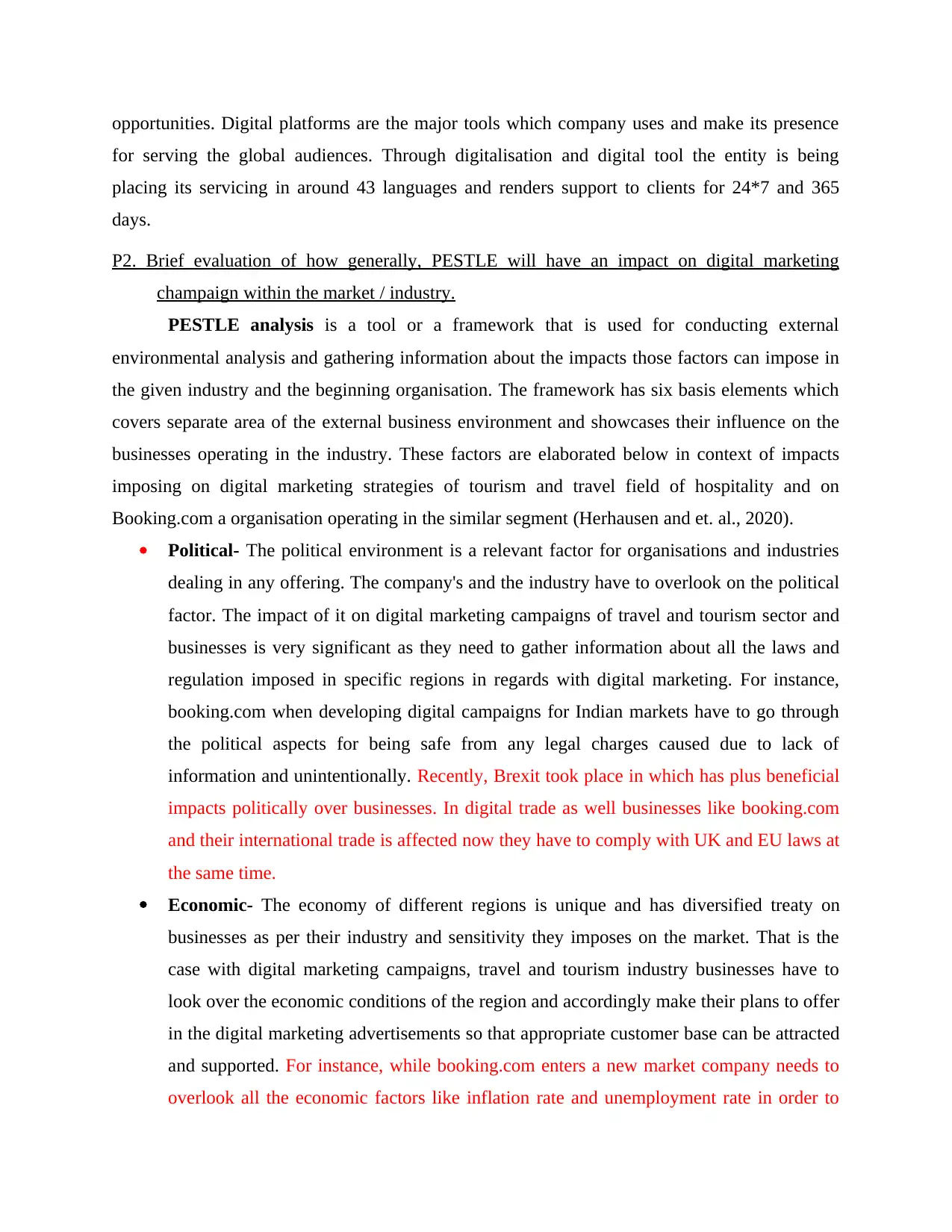
opportunities. Digital platforms are the major tools which company uses and make its presence
for serving the global audiences. Through digitalisation and digital tool the entity is being
placing its servicing in around 43 languages and renders support to clients for 24*7 and 365
days.
P2. Brief evaluation of how generally, PESTLE will have an impact on digital marketing
champaign within the market / industry.
PESTLE analysis is a tool or a framework that is used for conducting external
environmental analysis and gathering information about the impacts those factors can impose in
the given industry and the beginning organisation. The framework has six basis elements which
covers separate area of the external business environment and showcases their influence on the
businesses operating in the industry. These factors are elaborated below in context of impacts
imposing on digital marketing strategies of tourism and travel field of hospitality and on
Booking.com a organisation operating in the similar segment (Herhausen and et. al., 2020).
Political- The political environment is a relevant factor for organisations and industries
dealing in any offering. The company's and the industry have to overlook on the political
factor. The impact of it on digital marketing campaigns of travel and tourism sector and
businesses is very significant as they need to gather information about all the laws and
regulation imposed in specific regions in regards with digital marketing. For instance,
booking.com when developing digital campaigns for Indian markets have to go through
the political aspects for being safe from any legal charges caused due to lack of
information and unintentionally. Recently, Brexit took place in which has plus beneficial
impacts politically over businesses. In digital trade as well businesses like booking.com
and their international trade is affected now they have to comply with UK and EU laws at
the same time.
Economic- The economy of different regions is unique and has diversified treaty on
businesses as per their industry and sensitivity they imposes on the market. That is the
case with digital marketing campaigns, travel and tourism industry businesses have to
look over the economic conditions of the region and accordingly make their plans to offer
in the digital marketing advertisements so that appropriate customer base can be attracted
and supported. For instance, while booking.com enters a new market company needs to
overlook all the economic factors like inflation rate and unemployment rate in order to
for serving the global audiences. Through digitalisation and digital tool the entity is being
placing its servicing in around 43 languages and renders support to clients for 24*7 and 365
days.
P2. Brief evaluation of how generally, PESTLE will have an impact on digital marketing
champaign within the market / industry.
PESTLE analysis is a tool or a framework that is used for conducting external
environmental analysis and gathering information about the impacts those factors can impose in
the given industry and the beginning organisation. The framework has six basis elements which
covers separate area of the external business environment and showcases their influence on the
businesses operating in the industry. These factors are elaborated below in context of impacts
imposing on digital marketing strategies of tourism and travel field of hospitality and on
Booking.com a organisation operating in the similar segment (Herhausen and et. al., 2020).
Political- The political environment is a relevant factor for organisations and industries
dealing in any offering. The company's and the industry have to overlook on the political
factor. The impact of it on digital marketing campaigns of travel and tourism sector and
businesses is very significant as they need to gather information about all the laws and
regulation imposed in specific regions in regards with digital marketing. For instance,
booking.com when developing digital campaigns for Indian markets have to go through
the political aspects for being safe from any legal charges caused due to lack of
information and unintentionally. Recently, Brexit took place in which has plus beneficial
impacts politically over businesses. In digital trade as well businesses like booking.com
and their international trade is affected now they have to comply with UK and EU laws at
the same time.
Economic- The economy of different regions is unique and has diversified treaty on
businesses as per their industry and sensitivity they imposes on the market. That is the
case with digital marketing campaigns, travel and tourism industry businesses have to
look over the economic conditions of the region and accordingly make their plans to offer
in the digital marketing advertisements so that appropriate customer base can be attracted
and supported. For instance, while booking.com enters a new market company needs to
overlook all the economic factors like inflation rate and unemployment rate in order to
Paraphrase This Document
Need a fresh take? Get an instant paraphrase of this document with our AI Paraphraser
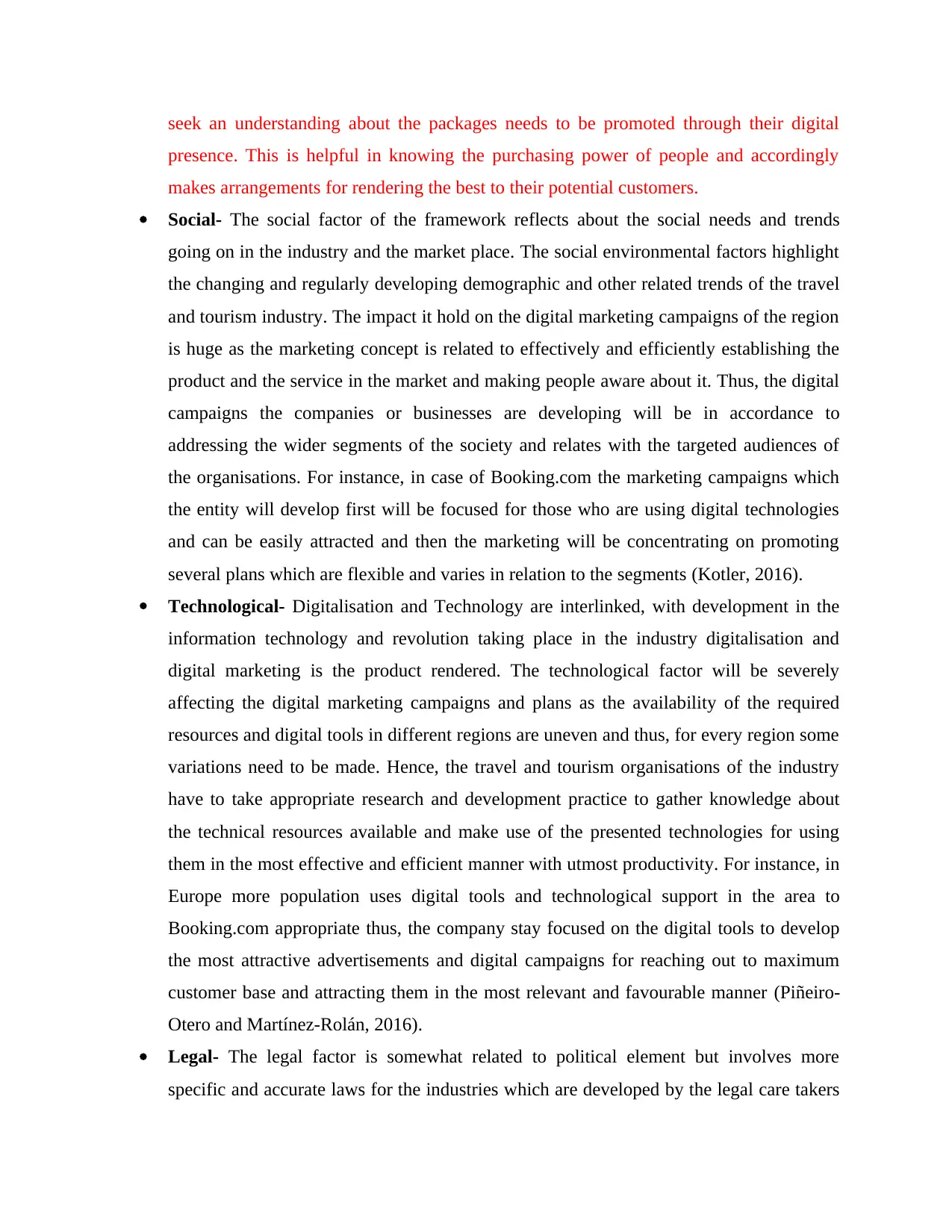
seek an understanding about the packages needs to be promoted through their digital
presence. This is helpful in knowing the purchasing power of people and accordingly
makes arrangements for rendering the best to their potential customers.
Social- The social factor of the framework reflects about the social needs and trends
going on in the industry and the market place. The social environmental factors highlight
the changing and regularly developing demographic and other related trends of the travel
and tourism industry. The impact it hold on the digital marketing campaigns of the region
is huge as the marketing concept is related to effectively and efficiently establishing the
product and the service in the market and making people aware about it. Thus, the digital
campaigns the companies or businesses are developing will be in accordance to
addressing the wider segments of the society and relates with the targeted audiences of
the organisations. For instance, in case of Booking.com the marketing campaigns which
the entity will develop first will be focused for those who are using digital technologies
and can be easily attracted and then the marketing will be concentrating on promoting
several plans which are flexible and varies in relation to the segments (Kotler, 2016).
Technological- Digitalisation and Technology are interlinked, with development in the
information technology and revolution taking place in the industry digitalisation and
digital marketing is the product rendered. The technological factor will be severely
affecting the digital marketing campaigns and plans as the availability of the required
resources and digital tools in different regions are uneven and thus, for every region some
variations need to be made. Hence, the travel and tourism organisations of the industry
have to take appropriate research and development practice to gather knowledge about
the technical resources available and make use of the presented technologies for using
them in the most effective and efficient manner with utmost productivity. For instance, in
Europe more population uses digital tools and technological support in the area to
Booking.com appropriate thus, the company stay focused on the digital tools to develop
the most attractive advertisements and digital campaigns for reaching out to maximum
customer base and attracting them in the most relevant and favourable manner (Piñeiro-
Otero and Martínez-Rolán, 2016).
Legal- The legal factor is somewhat related to political element but involves more
specific and accurate laws for the industries which are developed by the legal care takers
presence. This is helpful in knowing the purchasing power of people and accordingly
makes arrangements for rendering the best to their potential customers.
Social- The social factor of the framework reflects about the social needs and trends
going on in the industry and the market place. The social environmental factors highlight
the changing and regularly developing demographic and other related trends of the travel
and tourism industry. The impact it hold on the digital marketing campaigns of the region
is huge as the marketing concept is related to effectively and efficiently establishing the
product and the service in the market and making people aware about it. Thus, the digital
campaigns the companies or businesses are developing will be in accordance to
addressing the wider segments of the society and relates with the targeted audiences of
the organisations. For instance, in case of Booking.com the marketing campaigns which
the entity will develop first will be focused for those who are using digital technologies
and can be easily attracted and then the marketing will be concentrating on promoting
several plans which are flexible and varies in relation to the segments (Kotler, 2016).
Technological- Digitalisation and Technology are interlinked, with development in the
information technology and revolution taking place in the industry digitalisation and
digital marketing is the product rendered. The technological factor will be severely
affecting the digital marketing campaigns and plans as the availability of the required
resources and digital tools in different regions are uneven and thus, for every region some
variations need to be made. Hence, the travel and tourism organisations of the industry
have to take appropriate research and development practice to gather knowledge about
the technical resources available and make use of the presented technologies for using
them in the most effective and efficient manner with utmost productivity. For instance, in
Europe more population uses digital tools and technological support in the area to
Booking.com appropriate thus, the company stay focused on the digital tools to develop
the most attractive advertisements and digital campaigns for reaching out to maximum
customer base and attracting them in the most relevant and favourable manner (Piñeiro-
Otero and Martínez-Rolán, 2016).
Legal- The legal factor is somewhat related to political element but involves more
specific and accurate laws for the industries which are developed by the legal care takers
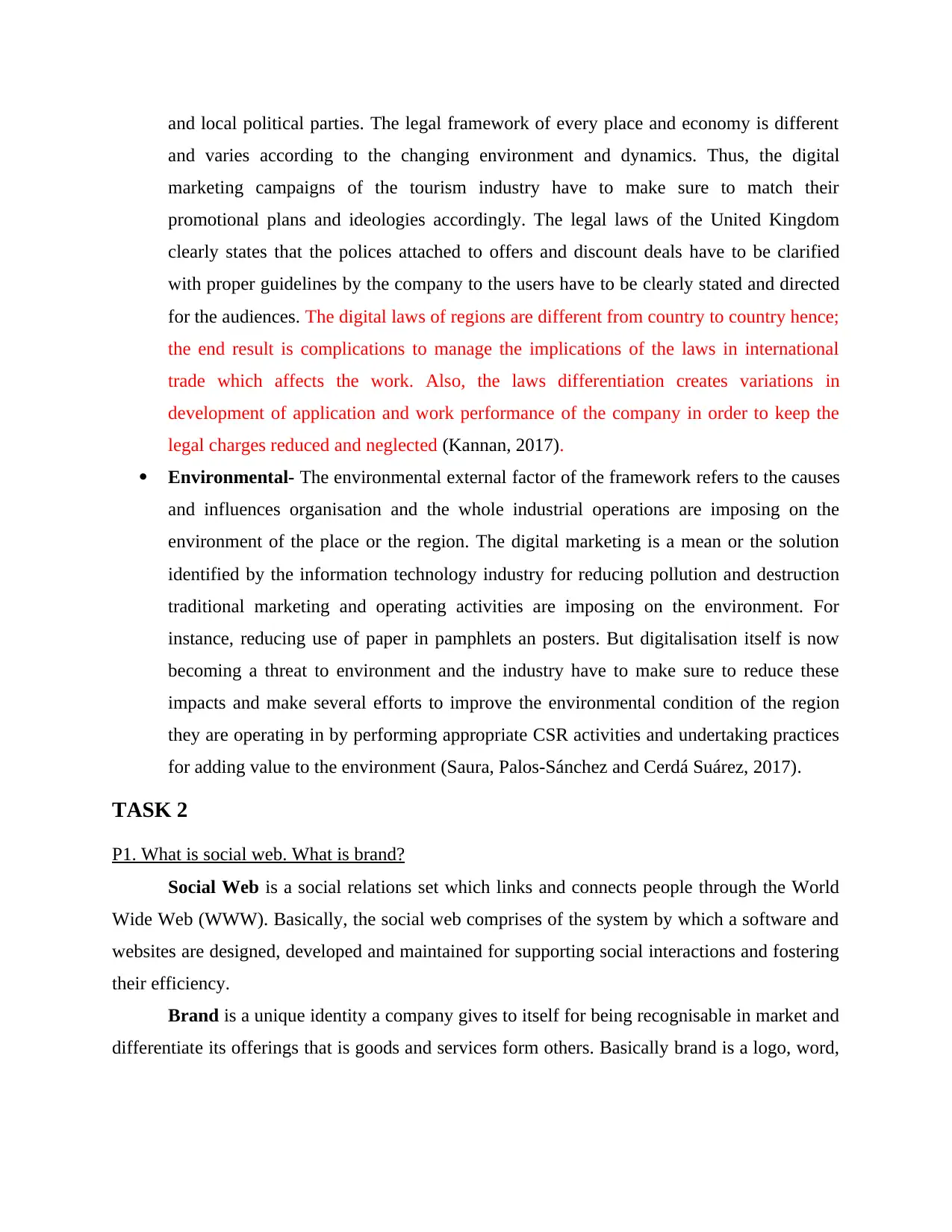
and local political parties. The legal framework of every place and economy is different
and varies according to the changing environment and dynamics. Thus, the digital
marketing campaigns of the tourism industry have to make sure to match their
promotional plans and ideologies accordingly. The legal laws of the United Kingdom
clearly states that the polices attached to offers and discount deals have to be clarified
with proper guidelines by the company to the users have to be clearly stated and directed
for the audiences. The digital laws of regions are different from country to country hence;
the end result is complications to manage the implications of the laws in international
trade which affects the work. Also, the laws differentiation creates variations in
development of application and work performance of the company in order to keep the
legal charges reduced and neglected (Kannan, 2017).
Environmental- The environmental external factor of the framework refers to the causes
and influences organisation and the whole industrial operations are imposing on the
environment of the place or the region. The digital marketing is a mean or the solution
identified by the information technology industry for reducing pollution and destruction
traditional marketing and operating activities are imposing on the environment. For
instance, reducing use of paper in pamphlets an posters. But digitalisation itself is now
becoming a threat to environment and the industry have to make sure to reduce these
impacts and make several efforts to improve the environmental condition of the region
they are operating in by performing appropriate CSR activities and undertaking practices
for adding value to the environment (Saura, Palos-Sánchez and Cerdá Suárez, 2017).
TASK 2
P1. What is social web. What is brand?
Social Web is a social relations set which links and connects people through the World
Wide Web (WWW). Basically, the social web comprises of the system by which a software and
websites are designed, developed and maintained for supporting social interactions and fostering
their efficiency.
Brand is a unique identity a company gives to itself for being recognisable in market and
differentiate its offerings that is goods and services form others. Basically brand is a logo, word,
and varies according to the changing environment and dynamics. Thus, the digital
marketing campaigns of the tourism industry have to make sure to match their
promotional plans and ideologies accordingly. The legal laws of the United Kingdom
clearly states that the polices attached to offers and discount deals have to be clarified
with proper guidelines by the company to the users have to be clearly stated and directed
for the audiences. The digital laws of regions are different from country to country hence;
the end result is complications to manage the implications of the laws in international
trade which affects the work. Also, the laws differentiation creates variations in
development of application and work performance of the company in order to keep the
legal charges reduced and neglected (Kannan, 2017).
Environmental- The environmental external factor of the framework refers to the causes
and influences organisation and the whole industrial operations are imposing on the
environment of the place or the region. The digital marketing is a mean or the solution
identified by the information technology industry for reducing pollution and destruction
traditional marketing and operating activities are imposing on the environment. For
instance, reducing use of paper in pamphlets an posters. But digitalisation itself is now
becoming a threat to environment and the industry have to make sure to reduce these
impacts and make several efforts to improve the environmental condition of the region
they are operating in by performing appropriate CSR activities and undertaking practices
for adding value to the environment (Saura, Palos-Sánchez and Cerdá Suárez, 2017).
TASK 2
P1. What is social web. What is brand?
Social Web is a social relations set which links and connects people through the World
Wide Web (WWW). Basically, the social web comprises of the system by which a software and
websites are designed, developed and maintained for supporting social interactions and fostering
their efficiency.
Brand is a unique identity a company gives to itself for being recognisable in market and
differentiate its offerings that is goods and services form others. Basically brand is a logo, word,
⊘ This is a preview!⊘
Do you want full access?
Subscribe today to unlock all pages.

Trusted by 1+ million students worldwide
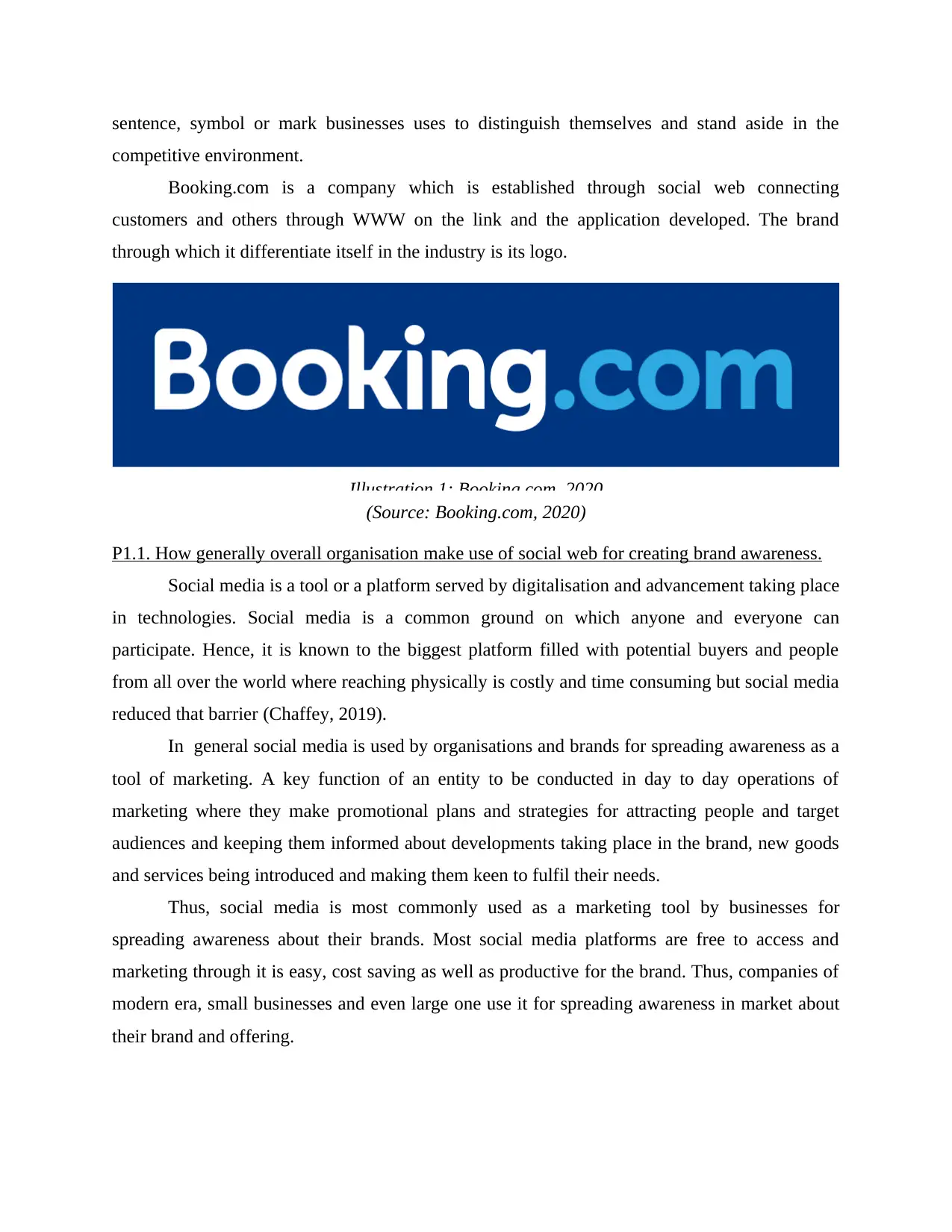
sentence, symbol or mark businesses uses to distinguish themselves and stand aside in the
competitive environment.
Booking.com is a company which is established through social web connecting
customers and others through WWW on the link and the application developed. The brand
through which it differentiate itself in the industry is its logo.
Illustration 1: Booking.com, 2020
(Source: Booking.com, 2020)
P1.1. How generally overall organisation make use of social web for creating brand awareness.
Social media is a tool or a platform served by digitalisation and advancement taking place
in technologies. Social media is a common ground on which anyone and everyone can
participate. Hence, it is known to the biggest platform filled with potential buyers and people
from all over the world where reaching physically is costly and time consuming but social media
reduced that barrier (Chaffey, 2019).
In general social media is used by organisations and brands for spreading awareness as a
tool of marketing. A key function of an entity to be conducted in day to day operations of
marketing where they make promotional plans and strategies for attracting people and target
audiences and keeping them informed about developments taking place in the brand, new goods
and services being introduced and making them keen to fulfil their needs.
Thus, social media is most commonly used as a marketing tool by businesses for
spreading awareness about their brands. Most social media platforms are free to access and
marketing through it is easy, cost saving as well as productive for the brand. Thus, companies of
modern era, small businesses and even large one use it for spreading awareness in market about
their brand and offering.
competitive environment.
Booking.com is a company which is established through social web connecting
customers and others through WWW on the link and the application developed. The brand
through which it differentiate itself in the industry is its logo.
Illustration 1: Booking.com, 2020
(Source: Booking.com, 2020)
P1.1. How generally overall organisation make use of social web for creating brand awareness.
Social media is a tool or a platform served by digitalisation and advancement taking place
in technologies. Social media is a common ground on which anyone and everyone can
participate. Hence, it is known to the biggest platform filled with potential buyers and people
from all over the world where reaching physically is costly and time consuming but social media
reduced that barrier (Chaffey, 2019).
In general social media is used by organisations and brands for spreading awareness as a
tool of marketing. A key function of an entity to be conducted in day to day operations of
marketing where they make promotional plans and strategies for attracting people and target
audiences and keeping them informed about developments taking place in the brand, new goods
and services being introduced and making them keen to fulfil their needs.
Thus, social media is most commonly used as a marketing tool by businesses for
spreading awareness about their brands. Most social media platforms are free to access and
marketing through it is easy, cost saving as well as productive for the brand. Thus, companies of
modern era, small businesses and even large one use it for spreading awareness in market about
their brand and offering.
Paraphrase This Document
Need a fresh take? Get an instant paraphrase of this document with our AI Paraphraser
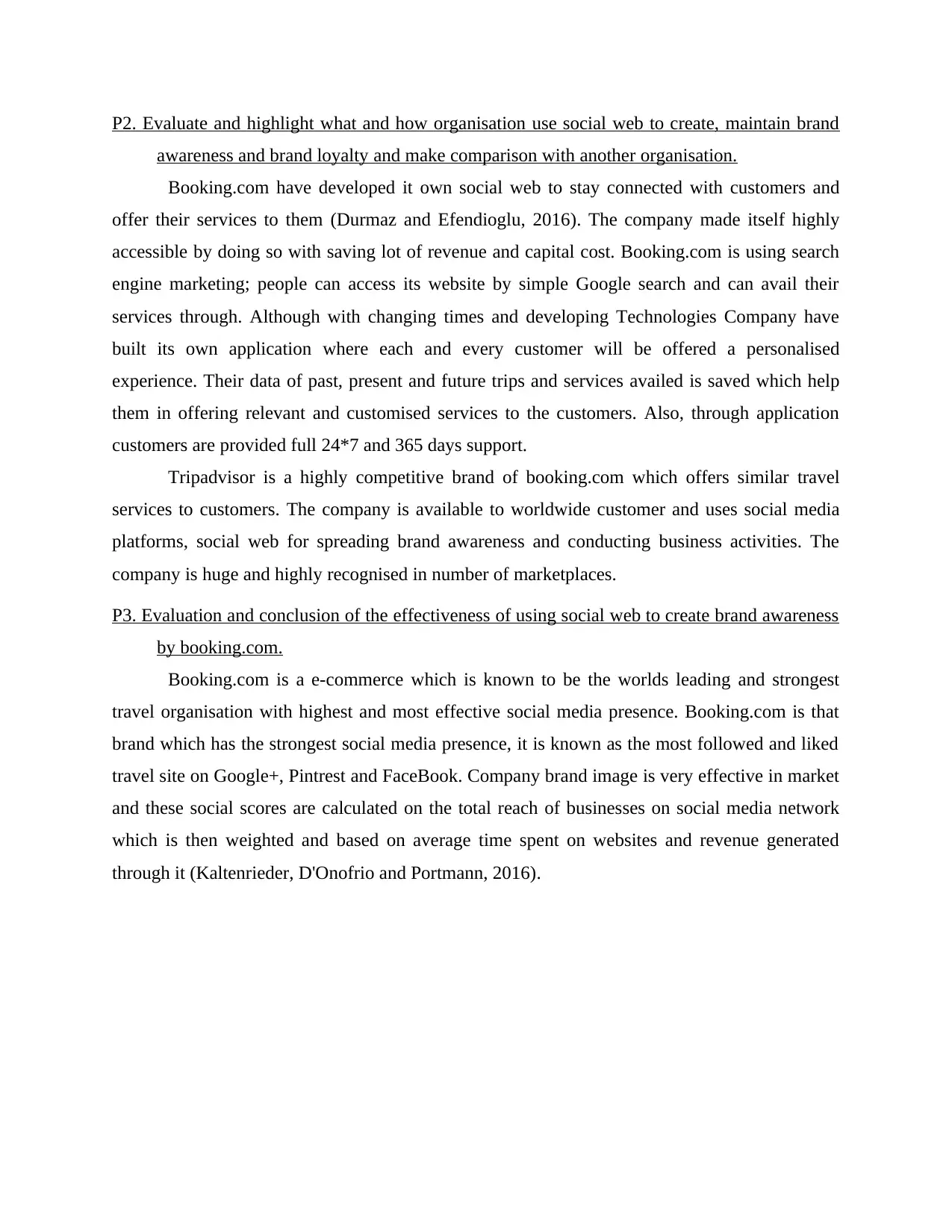
P2. Evaluate and highlight what and how organisation use social web to create, maintain brand
awareness and brand loyalty and make comparison with another organisation.
Booking.com have developed it own social web to stay connected with customers and
offer their services to them (Durmaz and Efendioglu, 2016). The company made itself highly
accessible by doing so with saving lot of revenue and capital cost. Booking.com is using search
engine marketing; people can access its website by simple Google search and can avail their
services through. Although with changing times and developing Technologies Company have
built its own application where each and every customer will be offered a personalised
experience. Their data of past, present and future trips and services availed is saved which help
them in offering relevant and customised services to the customers. Also, through application
customers are provided full 24*7 and 365 days support.
Tripadvisor is a highly competitive brand of booking.com which offers similar travel
services to customers. The company is available to worldwide customer and uses social media
platforms, social web for spreading brand awareness and conducting business activities. The
company is huge and highly recognised in number of marketplaces.
P3. Evaluation and conclusion of the effectiveness of using social web to create brand awareness
by booking.com.
Booking.com is a e-commerce which is known to be the worlds leading and strongest
travel organisation with highest and most effective social media presence. Booking.com is that
brand which has the strongest social media presence, it is known as the most followed and liked
travel site on Google+, Pintrest and FaceBook. Company brand image is very effective in market
and these social scores are calculated on the total reach of businesses on social media network
which is then weighted and based on average time spent on websites and revenue generated
through it (Kaltenrieder, D'Onofrio and Portmann, 2016).
awareness and brand loyalty and make comparison with another organisation.
Booking.com have developed it own social web to stay connected with customers and
offer their services to them (Durmaz and Efendioglu, 2016). The company made itself highly
accessible by doing so with saving lot of revenue and capital cost. Booking.com is using search
engine marketing; people can access its website by simple Google search and can avail their
services through. Although with changing times and developing Technologies Company have
built its own application where each and every customer will be offered a personalised
experience. Their data of past, present and future trips and services availed is saved which help
them in offering relevant and customised services to the customers. Also, through application
customers are provided full 24*7 and 365 days support.
Tripadvisor is a highly competitive brand of booking.com which offers similar travel
services to customers. The company is available to worldwide customer and uses social media
platforms, social web for spreading brand awareness and conducting business activities. The
company is huge and highly recognised in number of marketplaces.
P3. Evaluation and conclusion of the effectiveness of using social web to create brand awareness
by booking.com.
Booking.com is a e-commerce which is known to be the worlds leading and strongest
travel organisation with highest and most effective social media presence. Booking.com is that
brand which has the strongest social media presence, it is known as the most followed and liked
travel site on Google+, Pintrest and FaceBook. Company brand image is very effective in market
and these social scores are calculated on the total reach of businesses on social media network
which is then weighted and based on average time spent on websites and revenue generated
through it (Kaltenrieder, D'Onofrio and Portmann, 2016).
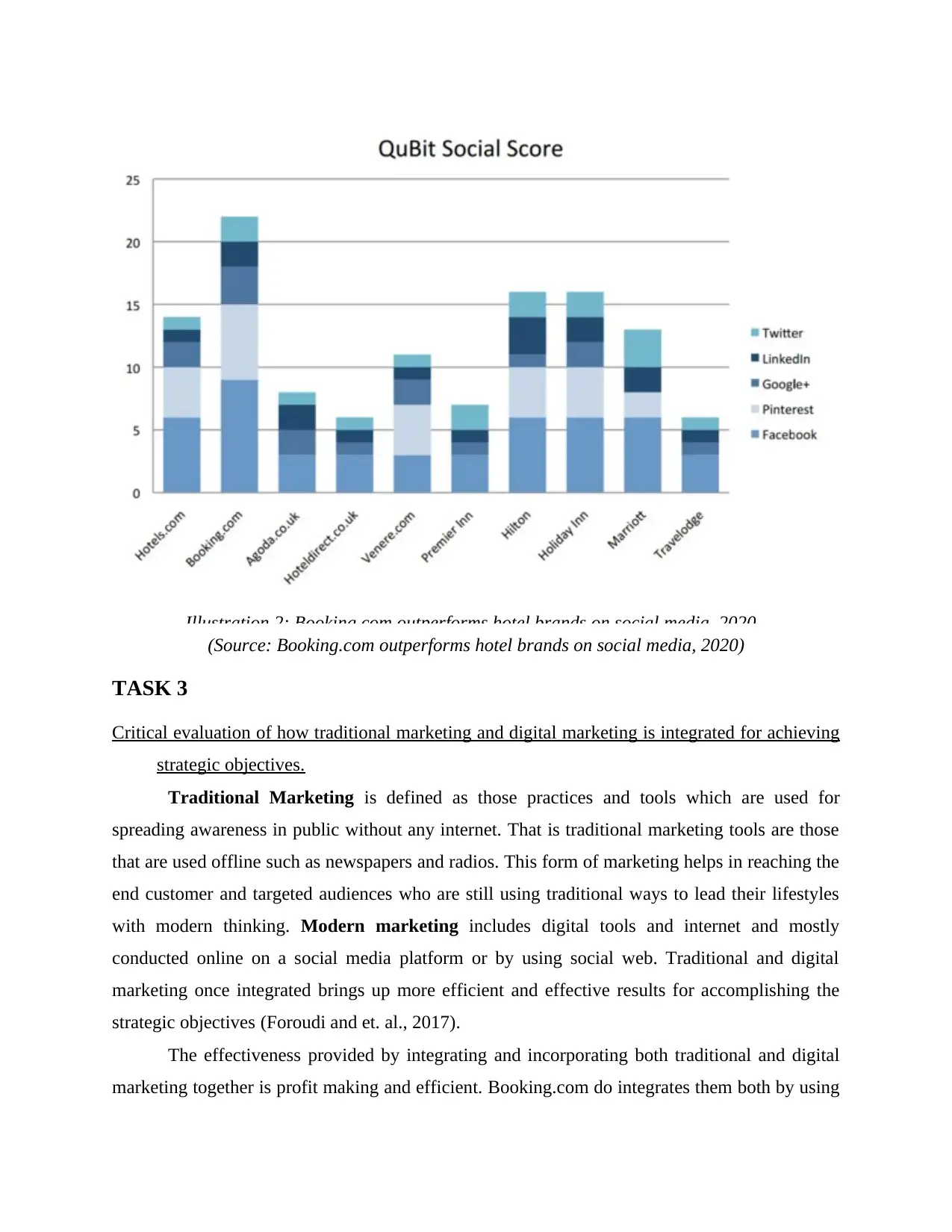
Illustration 2: Booking.com outperforms hotel brands on social media, 2020
(Source: Booking.com outperforms hotel brands on social media, 2020)
TASK 3
Critical evaluation of how traditional marketing and digital marketing is integrated for achieving
strategic objectives.
Traditional Marketing is defined as those practices and tools which are used for
spreading awareness in public without any internet. That is traditional marketing tools are those
that are used offline such as newspapers and radios. This form of marketing helps in reaching the
end customer and targeted audiences who are still using traditional ways to lead their lifestyles
with modern thinking. Modern marketing includes digital tools and internet and mostly
conducted online on a social media platform or by using social web. Traditional and digital
marketing once integrated brings up more efficient and effective results for accomplishing the
strategic objectives (Foroudi and et. al., 2017).
The effectiveness provided by integrating and incorporating both traditional and digital
marketing together is profit making and efficient. Booking.com do integrates them both by using
(Source: Booking.com outperforms hotel brands on social media, 2020)
TASK 3
Critical evaluation of how traditional marketing and digital marketing is integrated for achieving
strategic objectives.
Traditional Marketing is defined as those practices and tools which are used for
spreading awareness in public without any internet. That is traditional marketing tools are those
that are used offline such as newspapers and radios. This form of marketing helps in reaching the
end customer and targeted audiences who are still using traditional ways to lead their lifestyles
with modern thinking. Modern marketing includes digital tools and internet and mostly
conducted online on a social media platform or by using social web. Traditional and digital
marketing once integrated brings up more efficient and effective results for accomplishing the
strategic objectives (Foroudi and et. al., 2017).
The effectiveness provided by integrating and incorporating both traditional and digital
marketing together is profit making and efficient. Booking.com do integrates them both by using
⊘ This is a preview!⊘
Do you want full access?
Subscribe today to unlock all pages.

Trusted by 1+ million students worldwide
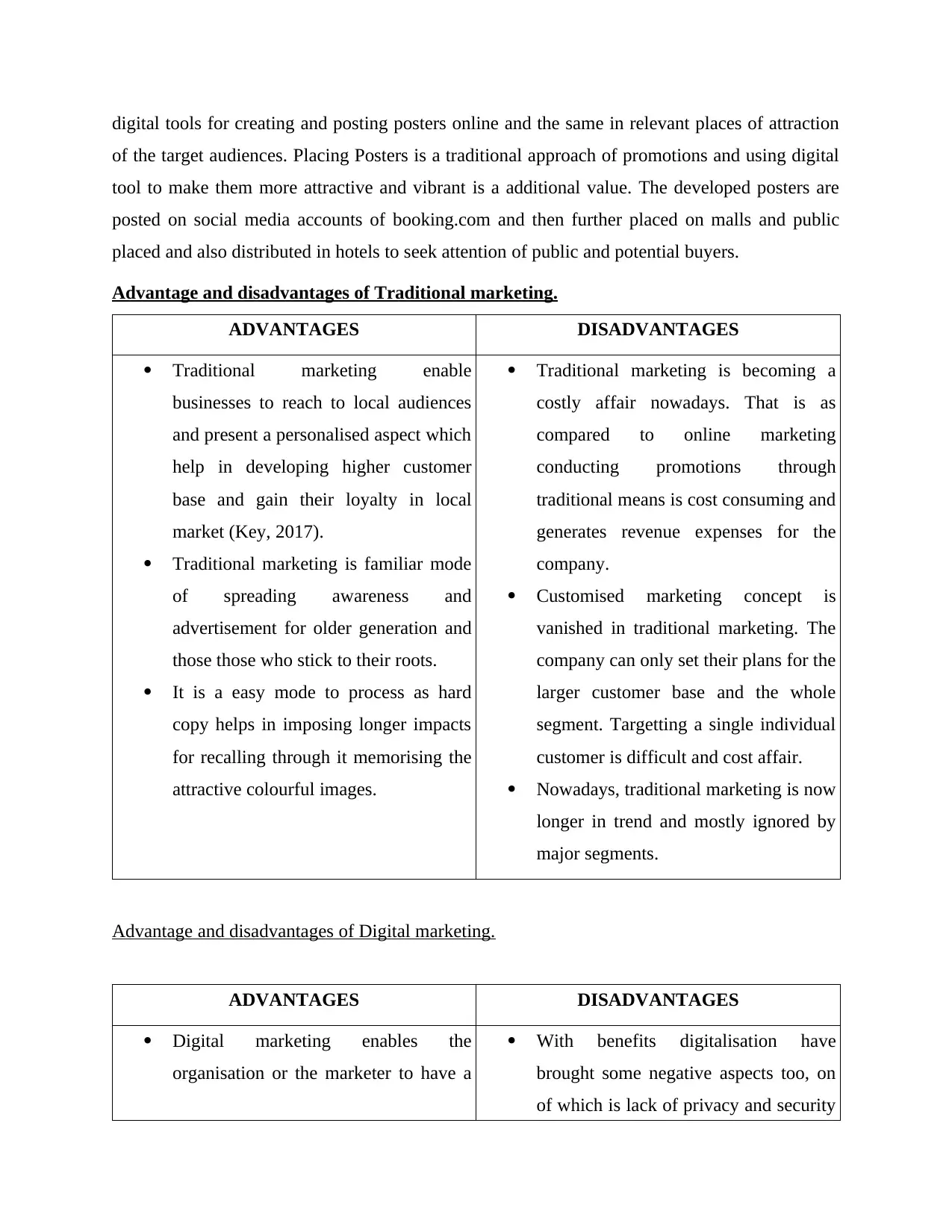
digital tools for creating and posting posters online and the same in relevant places of attraction
of the target audiences. Placing Posters is a traditional approach of promotions and using digital
tool to make them more attractive and vibrant is a additional value. The developed posters are
posted on social media accounts of booking.com and then further placed on malls and public
placed and also distributed in hotels to seek attention of public and potential buyers.
Advantage and disadvantages of Traditional marketing.
ADVANTAGES DISADVANTAGES
Traditional marketing enable
businesses to reach to local audiences
and present a personalised aspect which
help in developing higher customer
base and gain their loyalty in local
market (Key, 2017).
Traditional marketing is familiar mode
of spreading awareness and
advertisement for older generation and
those those who stick to their roots.
It is a easy mode to process as hard
copy helps in imposing longer impacts
for recalling through it memorising the
attractive colourful images.
Traditional marketing is becoming a
costly affair nowadays. That is as
compared to online marketing
conducting promotions through
traditional means is cost consuming and
generates revenue expenses for the
company.
Customised marketing concept is
vanished in traditional marketing. The
company can only set their plans for the
larger customer base and the whole
segment. Targetting a single individual
customer is difficult and cost affair.
Nowadays, traditional marketing is now
longer in trend and mostly ignored by
major segments.
Advantage and disadvantages of Digital marketing.
ADVANTAGES DISADVANTAGES
Digital marketing enables the
organisation or the marketer to have a
With benefits digitalisation have
brought some negative aspects too, on
of which is lack of privacy and security
of the target audiences. Placing Posters is a traditional approach of promotions and using digital
tool to make them more attractive and vibrant is a additional value. The developed posters are
posted on social media accounts of booking.com and then further placed on malls and public
placed and also distributed in hotels to seek attention of public and potential buyers.
Advantage and disadvantages of Traditional marketing.
ADVANTAGES DISADVANTAGES
Traditional marketing enable
businesses to reach to local audiences
and present a personalised aspect which
help in developing higher customer
base and gain their loyalty in local
market (Key, 2017).
Traditional marketing is familiar mode
of spreading awareness and
advertisement for older generation and
those those who stick to their roots.
It is a easy mode to process as hard
copy helps in imposing longer impacts
for recalling through it memorising the
attractive colourful images.
Traditional marketing is becoming a
costly affair nowadays. That is as
compared to online marketing
conducting promotions through
traditional means is cost consuming and
generates revenue expenses for the
company.
Customised marketing concept is
vanished in traditional marketing. The
company can only set their plans for the
larger customer base and the whole
segment. Targetting a single individual
customer is difficult and cost affair.
Nowadays, traditional marketing is now
longer in trend and mostly ignored by
major segments.
Advantage and disadvantages of Digital marketing.
ADVANTAGES DISADVANTAGES
Digital marketing enables the
organisation or the marketer to have a
With benefits digitalisation have
brought some negative aspects too, on
of which is lack of privacy and security
Paraphrase This Document
Need a fresh take? Get an instant paraphrase of this document with our AI Paraphraser
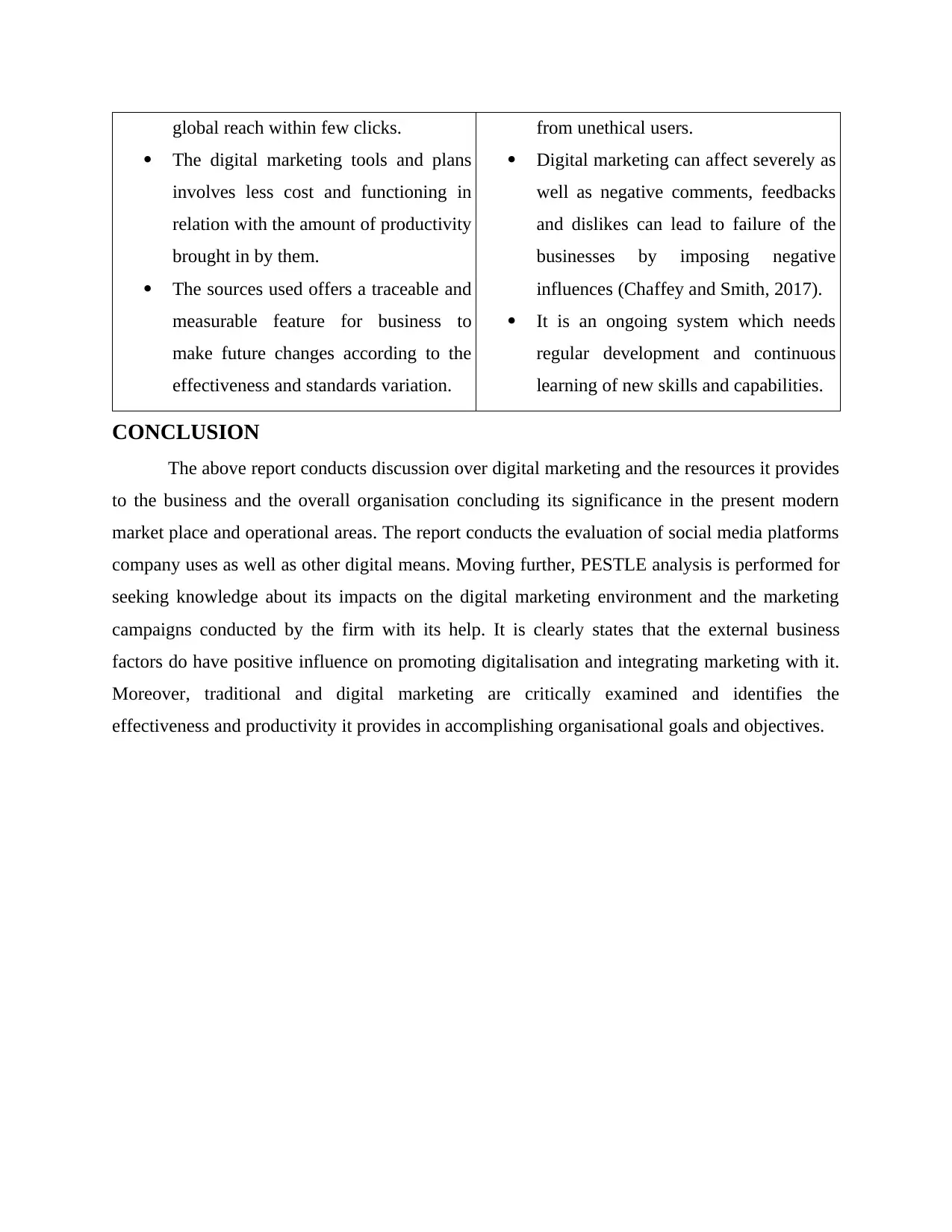
global reach within few clicks.
The digital marketing tools and plans
involves less cost and functioning in
relation with the amount of productivity
brought in by them.
The sources used offers a traceable and
measurable feature for business to
make future changes according to the
effectiveness and standards variation.
from unethical users.
Digital marketing can affect severely as
well as negative comments, feedbacks
and dislikes can lead to failure of the
businesses by imposing negative
influences (Chaffey and Smith, 2017).
It is an ongoing system which needs
regular development and continuous
learning of new skills and capabilities.
CONCLUSION
The above report conducts discussion over digital marketing and the resources it provides
to the business and the overall organisation concluding its significance in the present modern
market place and operational areas. The report conducts the evaluation of social media platforms
company uses as well as other digital means. Moving further, PESTLE analysis is performed for
seeking knowledge about its impacts on the digital marketing environment and the marketing
campaigns conducted by the firm with its help. It is clearly states that the external business
factors do have positive influence on promoting digitalisation and integrating marketing with it.
Moreover, traditional and digital marketing are critically examined and identifies the
effectiveness and productivity it provides in accomplishing organisational goals and objectives.
The digital marketing tools and plans
involves less cost and functioning in
relation with the amount of productivity
brought in by them.
The sources used offers a traceable and
measurable feature for business to
make future changes according to the
effectiveness and standards variation.
from unethical users.
Digital marketing can affect severely as
well as negative comments, feedbacks
and dislikes can lead to failure of the
businesses by imposing negative
influences (Chaffey and Smith, 2017).
It is an ongoing system which needs
regular development and continuous
learning of new skills and capabilities.
CONCLUSION
The above report conducts discussion over digital marketing and the resources it provides
to the business and the overall organisation concluding its significance in the present modern
market place and operational areas. The report conducts the evaluation of social media platforms
company uses as well as other digital means. Moving further, PESTLE analysis is performed for
seeking knowledge about its impacts on the digital marketing environment and the marketing
campaigns conducted by the firm with its help. It is clearly states that the external business
factors do have positive influence on promoting digitalisation and integrating marketing with it.
Moreover, traditional and digital marketing are critically examined and identifies the
effectiveness and productivity it provides in accomplishing organisational goals and objectives.
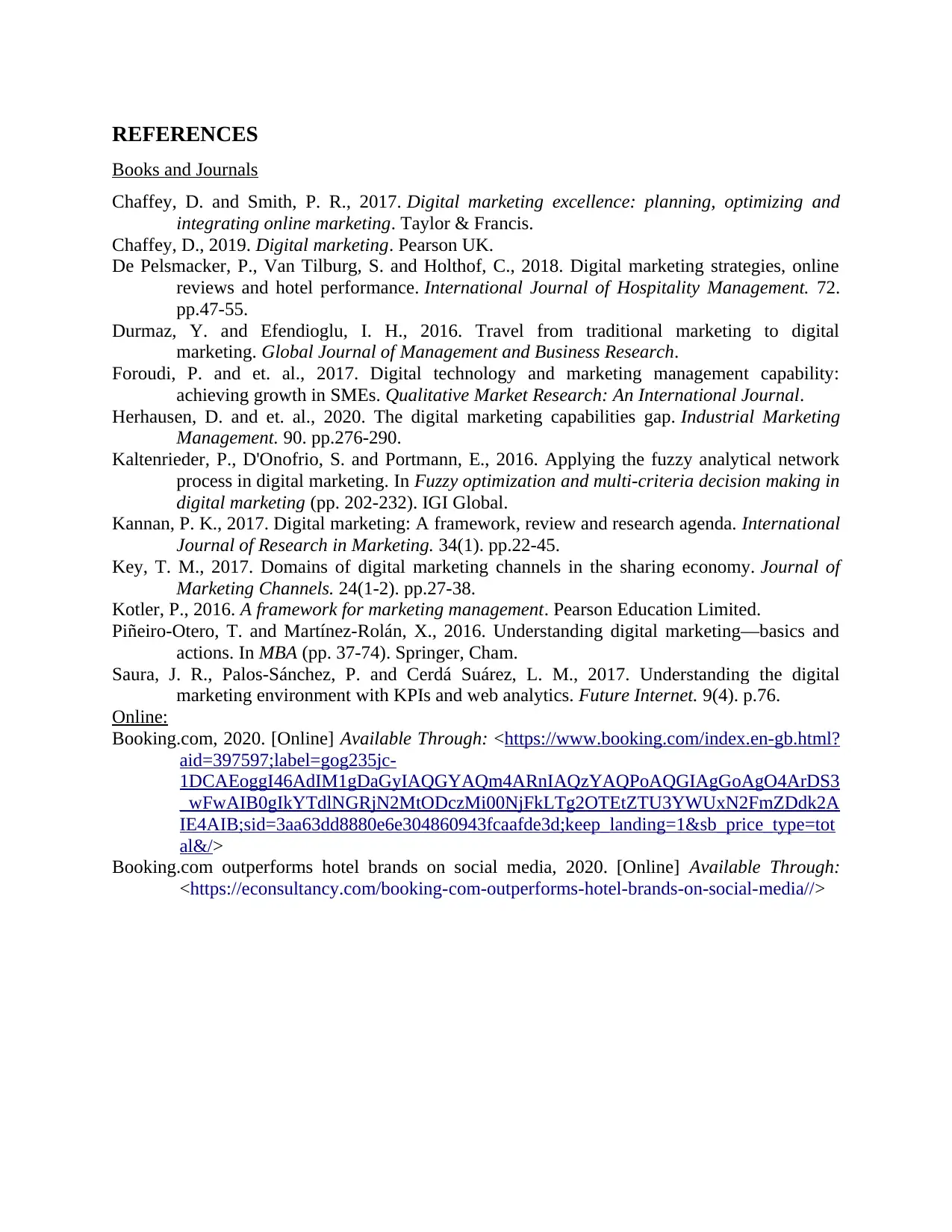
REFERENCES
Books and Journals
Chaffey, D. and Smith, P. R., 2017. Digital marketing excellence: planning, optimizing and
integrating online marketing. Taylor & Francis.
Chaffey, D., 2019. Digital marketing. Pearson UK.
De Pelsmacker, P., Van Tilburg, S. and Holthof, C., 2018. Digital marketing strategies, online
reviews and hotel performance. International Journal of Hospitality Management. 72.
pp.47-55.
Durmaz, Y. and Efendioglu, I. H., 2016. Travel from traditional marketing to digital
marketing. Global Journal of Management and Business Research.
Foroudi, P. and et. al., 2017. Digital technology and marketing management capability:
achieving growth in SMEs. Qualitative Market Research: An International Journal.
Herhausen, D. and et. al., 2020. The digital marketing capabilities gap. Industrial Marketing
Management. 90. pp.276-290.
Kaltenrieder, P., D'Onofrio, S. and Portmann, E., 2016. Applying the fuzzy analytical network
process in digital marketing. In Fuzzy optimization and multi-criteria decision making in
digital marketing (pp. 202-232). IGI Global.
Kannan, P. K., 2017. Digital marketing: A framework, review and research agenda. International
Journal of Research in Marketing. 34(1). pp.22-45.
Key, T. M., 2017. Domains of digital marketing channels in the sharing economy. Journal of
Marketing Channels. 24(1-2). pp.27-38.
Kotler, P., 2016. A framework for marketing management. Pearson Education Limited.
Piñeiro-Otero, T. and Martínez-Rolán, X., 2016. Understanding digital marketing—basics and
actions. In MBA (pp. 37-74). Springer, Cham.
Saura, J. R., Palos-Sánchez, P. and Cerdá Suárez, L. M., 2017. Understanding the digital
marketing environment with KPIs and web analytics. Future Internet. 9(4). p.76.
Online:
Booking.com, 2020. [Online] Available Through: <https://www.booking.com/index.en-gb.html?
aid=397597;label=gog235jc-
1DCAEoggI46AdIM1gDaGyIAQGYAQm4ARnIAQzYAQPoAQGIAgGoAgO4ArDS3
_wFwAIB0gIkYTdlNGRjN2MtODczMi00NjFkLTg2OTEtZTU3YWUxN2FmZDdk2A
IE4AIB;sid=3aa63dd8880e6e304860943fcaafde3d;keep_landing=1&sb_price_type=tot
al&/>
Booking.com outperforms hotel brands on social media, 2020. [Online] Available Through:
<https://econsultancy.com/booking-com-outperforms-hotel-brands-on-social-media//>
Books and Journals
Chaffey, D. and Smith, P. R., 2017. Digital marketing excellence: planning, optimizing and
integrating online marketing. Taylor & Francis.
Chaffey, D., 2019. Digital marketing. Pearson UK.
De Pelsmacker, P., Van Tilburg, S. and Holthof, C., 2018. Digital marketing strategies, online
reviews and hotel performance. International Journal of Hospitality Management. 72.
pp.47-55.
Durmaz, Y. and Efendioglu, I. H., 2016. Travel from traditional marketing to digital
marketing. Global Journal of Management and Business Research.
Foroudi, P. and et. al., 2017. Digital technology and marketing management capability:
achieving growth in SMEs. Qualitative Market Research: An International Journal.
Herhausen, D. and et. al., 2020. The digital marketing capabilities gap. Industrial Marketing
Management. 90. pp.276-290.
Kaltenrieder, P., D'Onofrio, S. and Portmann, E., 2016. Applying the fuzzy analytical network
process in digital marketing. In Fuzzy optimization and multi-criteria decision making in
digital marketing (pp. 202-232). IGI Global.
Kannan, P. K., 2017. Digital marketing: A framework, review and research agenda. International
Journal of Research in Marketing. 34(1). pp.22-45.
Key, T. M., 2017. Domains of digital marketing channels in the sharing economy. Journal of
Marketing Channels. 24(1-2). pp.27-38.
Kotler, P., 2016. A framework for marketing management. Pearson Education Limited.
Piñeiro-Otero, T. and Martínez-Rolán, X., 2016. Understanding digital marketing—basics and
actions. In MBA (pp. 37-74). Springer, Cham.
Saura, J. R., Palos-Sánchez, P. and Cerdá Suárez, L. M., 2017. Understanding the digital
marketing environment with KPIs and web analytics. Future Internet. 9(4). p.76.
Online:
Booking.com, 2020. [Online] Available Through: <https://www.booking.com/index.en-gb.html?
aid=397597;label=gog235jc-
1DCAEoggI46AdIM1gDaGyIAQGYAQm4ARnIAQzYAQPoAQGIAgGoAgO4ArDS3
_wFwAIB0gIkYTdlNGRjN2MtODczMi00NjFkLTg2OTEtZTU3YWUxN2FmZDdk2A
IE4AIB;sid=3aa63dd8880e6e304860943fcaafde3d;keep_landing=1&sb_price_type=tot
al&/>
Booking.com outperforms hotel brands on social media, 2020. [Online] Available Through:
<https://econsultancy.com/booking-com-outperforms-hotel-brands-on-social-media//>
⊘ This is a preview!⊘
Do you want full access?
Subscribe today to unlock all pages.

Trusted by 1+ million students worldwide
1 out of 12
Related Documents
Your All-in-One AI-Powered Toolkit for Academic Success.
+13062052269
info@desklib.com
Available 24*7 on WhatsApp / Email
![[object Object]](/_next/static/media/star-bottom.7253800d.svg)
Unlock your academic potential
Copyright © 2020–2025 A2Z Services. All Rights Reserved. Developed and managed by ZUCOL.





